The thermal energy harvesting market is estimated to be valued at USD 185.3 million in 2025 and is projected to reach USD 403.8 million by 2035, registering a compound annual growth rate (CAGR) of 8.1% over the forecast period.
The thermal energy harvesting market is expected to reach USD 403.8 billion by 2035, up from USD 185.3 billion in 2025, reflecting a strong CAGR of 8.1%. The expansion of this market is driven by the increasing focus on energy efficiency solutions and the need to capture otherwise wasted thermal energy across industrial and commercial applications. The market’s absolute dollar opportunity highlights significant value accumulation over the decade, as energy conversion devices and systems are increasingly adopted in sectors such as manufacturing, automotive, and electronics. This growth trajectory signals that the market is poised to benefit from rising industrial energy demands and the efficiency-driven replacement of conventional energy systems.
Over the 10-year period, the thermal energy harvesting market demonstrates a robust growth pattern, indicating that the adoption of heat-to-electricity solutions is being accelerated in response to operational cost reduction pressures. The market’s consistent increase in absolute dollar terms underlines that demand is being supported by the deployment of thermoelectric materials, waste heat recovery systems, and industrial-scale heat management solutions. By 2030, the market is projected to cross USD 300 billion, reinforcing that the sector’s value potential remains substantial. This trend reflects that stakeholders, including equipment manufacturers, system integrators, and energy service providers, are expected to witness strong returns through strategic investments and expanded market penetration.
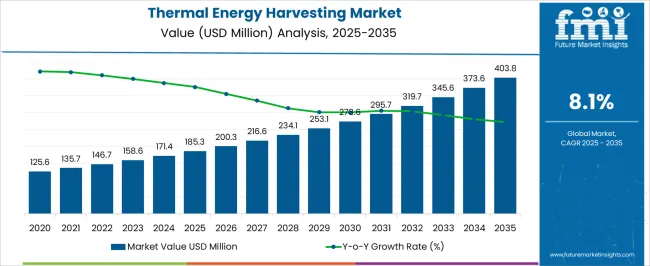
| Metric | Value |
|---|---|
| Thermal Energy Harvesting Market Estimated Value in (2025 E) | USD 185.3 million |
| Thermal Energy Harvesting Market Forecast Value in (2035 F) | USD 403.8 million |
| Forecast CAGR (2025 to 2035) | 8.1% |
The thermal energy harvesting market is estimated to hold a notable proportion within its parent markets, representing approximately 12-14% of the energy harvesting market, around 15-16% of the thermoelectric devices market, close to 5-6% of the renewable energy market, about 8-9% of the industrial energy management market, and roughly 6-7% of the electronics and IoT power solutions market. Collectively, the cumulative share across these parent segments is observed in the range of 46-52%, reflecting a significant presence of thermal energy harvesting solutions across industrial, electronic, and renewable energy applications. The market has been influenced by the demand for compact and efficient energy recovery solutions where operational efficiency, reliability, and adaptability are highly prioritized.
Adoption is guided by procurement decisions focused on integration capabilities, energy conversion efficiency, and suitability for diverse applications ranging from industrial machinery to low-power IoT devices. Market participants have emphasized high-performance thermoelectric materials, modular systems, and scalable deployment options to ensure consistent performance and energy yield in varying operational conditions. As a result, the thermal energy harvesting market has not only captured a substantial share within core energy harvesting and thermoelectric device segments but has also influenced industrial energy management, electronics, and IoT solutions, highlighting its strategic role in enabling energy optimization, reducing dependence on primary power sources, and enhancing operational resilience across multiple sectors.
The thermal energy harvesting market is witnessing accelerating growth due to increasing global emphasis on sustainable energy systems, energy autonomy, and power supply solutions for low-power devices. This market is being shaped by rising adoption of energy harvesting technologies in smart infrastructure, industrial automation, and IoT-based deployments where conventional power supply methods are either inefficient or impractical. Growing investments in miniaturized electronics, self-powered sensors, and wireless systems are increasing the relevance of thermal energy harvesters that convert ambient heat into usable electricity.
The shift toward battery-free operations in remote environments and maintenance-heavy sectors is driving the demand for reliable thermal energy sources. Technological advancements in thermoelectric materials, along with improvements in energy conversion efficiency, are strengthening the potential of these systems to support long-term, off-grid applications.
As industries adopt smarter monitoring systems and seek alternatives to traditional batteries, the market is expected to grow steadily The expanding use of smart sensors and the increasing viability of waste heat recovery are key trends supporting the long-term market trajectory.
The thermal energy harvesting market is segmented by component, end use, and geographic regions. By component, thermal energy harvesting market is divided into energy harvesting transducers, power management integrated circuits (PMIC), and others. In terms of end use, thermal energy harvesting market is classified into wireless sensor networks, consumer electronics, building automation, automotive, and others. Regionally, the thermal energy harvesting industry is classified into North America, Latin America, Western Europe, Eastern Europe, Balkan & Baltic Countries, Russia & Belarus, Central Asia, East Asia, South Asia & Pacific, and the Middle East & Africa.
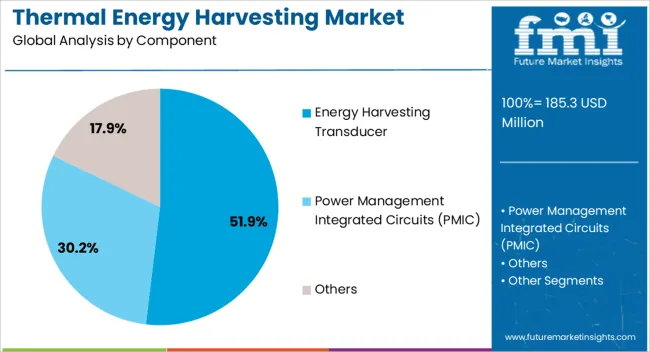
The energy harvesting transducer segment is projected to account for 51.9% of the thermal energy harvesting market revenue share in 2025, making it the largest component category. This leadership is attributed to the transducer's central role in capturing ambient thermal energy and converting it into electrical power for use in low-power electronic systems. The segment is benefiting from technological progress in thermoelectric materials that offer higher power output and better conversion efficiency.
As demand rises for autonomous systems, especially in locations where replacing or recharging batteries is not feasible, the importance of transducers has grown significantly. Their application spans across industrial monitoring, building automation, and transportation systems, where reliable and continuous power is required. The segment’s growth is further supported by integration with microelectronic systems and smart packaging, making it suitable for compact installations.
Additionally, improvements in form factor and durability have expanded their use in harsh or remote environments With growing pressure to reduce carbon footprints and eliminate battery dependencies, energy harvesting transducers are positioned to remain the backbone of thermal energy harvesting systems.
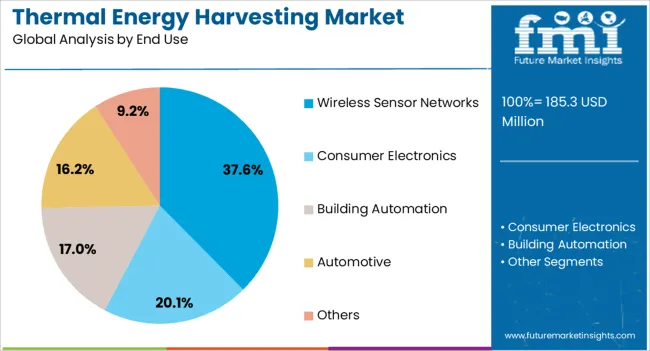
The wireless sensor networks segment is anticipated to hold 37.6% of the thermal energy harvesting market revenue share in 2025, positioning it as the leading end use category. This segment’s dominance is being driven by the widespread adoption of distributed sensing systems in industrial automation, environmental monitoring, smart cities, and infrastructure diagnostics. Wireless sensor networks require continuous low-power operation, often in inaccessible or remote areas where frequent battery replacement is neither practical nor cost-effective.
Thermal energy harvesting addresses these challenges by providing a sustainable and maintenance-free power source, enabling sensors to function autonomously over extended periods. The segment is further benefiting from advancements in ultra-low-power electronics and efficient energy storage integration, which enhance overall system reliability.
Increasing investments in smart infrastructure and Industry 4.0 initiatives are also reinforcing the demand for intelligent wireless sensor deployments powered by ambient energy As data-driven decision-making becomes integral across industries, the ability to operate sensors independently through harvested energy is expected to drive continued adoption within this high-growth segment.
The thermal energy harvesting market is fueled by demand from industrial, remote monitoring, and sensor applications. Opportunities are arising in IoT devices, wearables, and industrial automation, while trends emphasize miniaturization and hybrid systems. However, challenges such as high costs, efficiency limitations, and competition from alternative power sources remain significant. Despite these hurdles, the market outlook appears favorable as industries seek reliable, maintenance-free power sources, with growth expected to rely on improved material efficiency, diversified applications, and targeted adoption across energy-sensitive sectors worldwide.
The demand for thermal energy harvesting has been largely driven by industries seeking self-powered systems for remote monitoring, sensors, and low-maintenance devices. Manufacturing units, oil and gas facilities, and infrastructure operations are placing emphasis on energy scavenging from heat sources that would otherwise be wasted. Wireless sensor networks in harsh environments rely on thermal energy harvesters, reducing dependency on conventional batteries and frequent replacements. With increasing need for uninterrupted operations in remote areas, the adoption of thermal harvesting devices has been viewed as a practical solution, making demand both steady and long-term in nature.
Significant opportunities in the thermal energy harvesting market are being unlocked by the growing integration of IoT systems and wearable electronics. Devices such as smartwatches, fitness bands, and medical implants are finding value in self-charging mechanisms powered by body heat. The industrial IoT sector is equally exploring thermal harvesting modules for powering distributed sensors in pipelines, grids, and smart infrastructure. Energy management firms are testing new designs for micro-harvesters to support small-scale electronics. With industries moving toward cost-effective and maintenance-free solutions, these opportunities are considered promising avenues for producers to expand into high-growth application segments.
The most notable trends in the thermal energy harvesting market are centered on device miniaturization and hybrid energy harvesting systems. Compact harvesters are being developed to fit into smaller electronics without affecting performance, while hybrid systems combining thermal, vibration, and solar harvesting are gaining attention for their versatility. Research institutions and companies are focusing on thermoelectric materials with better efficiency to improve output levels. These trends show a strong inclination toward diversifying thermal harvesting applications across consumer, industrial, and healthcare segments, indicating that the market is steadily reshaping itself around flexibility and scalability.
Key challenges in the thermal energy harvesting market stem from high upfront costs and the limited efficiency of thermoelectric materials. Production expenses associated with advanced materials and module integration make large-scale adoption difficult, particularly for cost-sensitive industries. Conversion efficiency remains another major limitation, as existing thermoelectric generators often produce insufficient power for larger devices. Competition from alternative low-power solutions such as advanced batteries and capacitors has also restrained faster adoption. Unless material efficiency improves and costs are optimized, the market could face slower penetration beyond niche applications, making challenges a defining restraint for industry growth.
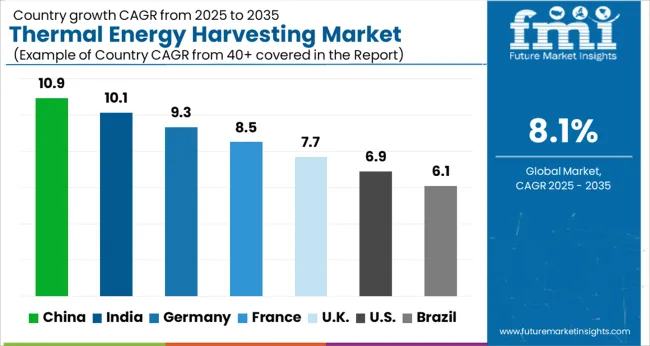
| Country | CAGR |
|---|---|
| China | 10.9% |
| India | 10.1% |
| Germany | 9.3% |
| France | 8.5% |
| UK | 7.7% |
| USA | 6.9% |
| Brazil | 6.1% |
The global thermal energy harvesting market is projected to grow at a CAGR of 8.1% from 2025 to 2035. China leads with a growth rate of 10.9%, followed by India at 10.1%, and Germany at 9.3%. The United Kingdom records a growth rate of 7.7%, while the United States shows the slowest growth at 6.9%. Expansion is supported by increasing adoption of self-powered devices, rising demand for energy-efficient solutions, and integration in industrial, automotive, and IoT applications. Emerging markets like China and India experience higher growth due to strong industrial activity, government support, and rapid technology adoption, while Europe and the USA focus on high-value applications and innovation. This report includes insights on 40+ countries; the top markets are shown here for reference.
The thermal energy harvesting market in China is projected to grow at a CAGR of 10.9%. This expansion is largely driven by strong industrial activity, government initiatives supporting energy-efficient systems, and rising adoption of IoT devices that require self-powered solutions. Chinese manufacturers are expanding their R&D investments to develop advanced thermoelectric materials, which are essential for improving efficiency and lowering costs. Integration of thermal energy harvesting into wearable electronics, sensors, and industrial equipment is expanding rapidly. The country also benefits from large-scale manufacturing capabilities that enable cost-effective production and export of thermal harvesting components. With strong domestic adoption and global outreach, China is positioned as the leading contributor to global market growth.
The thermal energy harvesting market in India is projected to grow at a CAGR of 10.1%. Rising demand is supported by increasing use of self-powered devices across industrial automation, smart cities, and remote monitoring systems. The government’s emphasis on energy-efficient technologies and IoT infrastructure development further supports market adoption. Indian companies are exploring partnerships with global technology providers to bring advanced thermoelectric modules and sensors into the domestic market. The healthcare sector, particularly in wearable monitoring devices, is also becoming a notable application area. As industrial modernization accelerates and consumer demand for smart devices increases, India is expected to emerge as one of the fastest-growing markets in thermal energy harvesting.
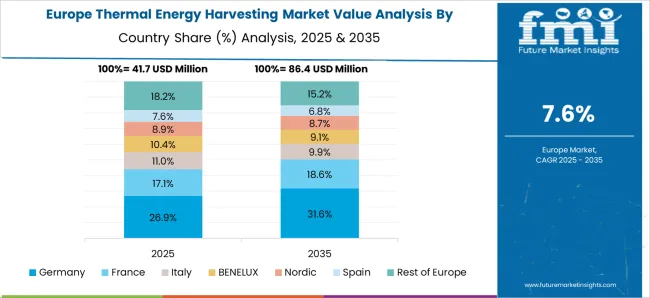
The thermal energy harvesting market in Germany is projected to grow at a CAGR of 9.3%. Growth is fueled by strong adoption in automotive, industrial automation, and renewable energy applications. German manufacturers are focusing on advanced thermoelectric materials and miniaturized modules to enhance device efficiency and durability. The automotive sector, particularly electric and hybrid vehicles, is adopting thermal energy harvesting systems to improve energy utilization. Supportive R&D programs and EU initiatives promoting clean energy solutions further strengthen the domestic market. Germany’s strong engineering base and focus on innovation place it as one of the most advanced adopters of thermal energy harvesting technologies in Europe.
The thermal energy harvesting market in the United Kingdom is projected to grow at a CAGR of 7.7%. Demand is shaped by adoption in IoT-enabled infrastructure, smart devices, and energy-efficient industrial systems. UK companies are investing in the development of compact thermal modules suitable for wearables and remote monitoring solutions. The healthcare sector is showing increasing interest in integrating energy-harvesting technology into patient monitoring and diagnostic devices. Collaborations with European technology providers are supporting advancements in local supply chains. While the growth rate is moderate compared to Asia, the UK remains an important European market focusing on high-value and specialized applications.
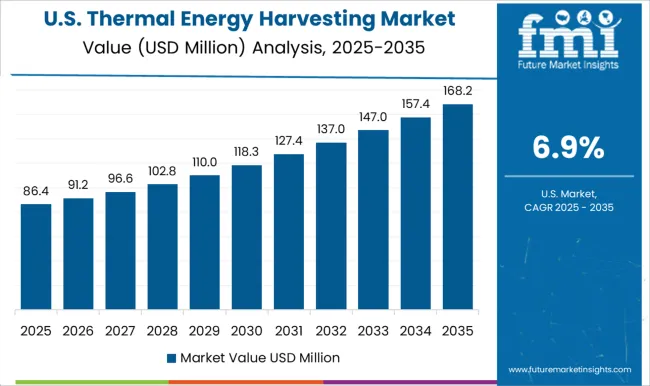
The thermal energy harvesting market in the United States is projected to grow at a CAGR of 6.9%. Growth is supported by rising applications in industrial automation, aerospace, and defense sectors. USA firms are prioritizing high-performance thermoelectric modules for critical applications where energy efficiency and reliability are essential. Research efforts are directed toward improving conversion efficiency and enabling integration into smart wearables and sensor networks. The healthcare sector is emerging as a promising application area, with self-powered monitoring devices gaining traction. Despite a slower growth rate compared to Asia, the USA maintains a significant role in driving innovation and setting standards for advanced thermal energy harvesting technologies.
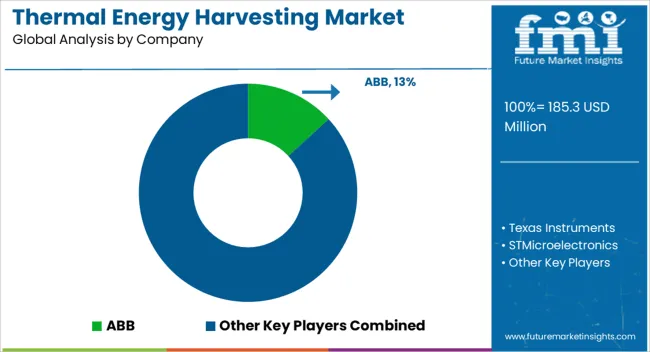
The thermal energy harvesting market is evolving as demand for self-powered devices, wireless sensors, and energy-efficient electronics accelerates across industrial, consumer, and automotive sectors. Leading technology companies such as ABB, Texas Instruments, STMicroelectronics, and Honeywell are leveraging their expertise in semiconductors, sensors, and control systems to develop scalable solutions that convert waste heat into usable energy. EnOcean and Fujitsu focus on building automation and IoT-driven applications, promoting harvesting systems that eliminate the need for wired power or frequent battery replacements.
Similarly, Renesas Electronics and Laird Thermal Systems, Inc. provide integrated microcontrollers and thermoelectric modules tailored for compact and high-performance devices, while ZF Friedrichshafen emphasizes automotive-grade energy harvesting applications in its product brochures, reflecting the growing electrification of mobility systems. The market also includes specialized players driving innovation in micro-thermoelectric systems. Powercast Corporation, Advanced Linear Devices, and Cedrat Technologies emphasize energy management circuits and advanced materials that optimize efficiency. Micropelt, Mide Technology, and Perpetua Power offer thermoelectric generators for industrial IoT, wearable devices, and remote monitoring applications, with a focus on long-term operational reliability and reduced maintenance.
Niche developers like Kinergizer highlight ultra-low-power solutions for smart sensors and connected electronics, often showcased as enablers of sustainable energy ecosystems in their technical catalogs. Distributors such as Mouser Electronics bridge the gap by ensuring global supply availability of harvesting modules and components. Across the market, players emphasize themes of reliability, miniaturization, and independence from conventional power sources in brochures and white papers, which resonate strongly with customers aiming to lower energy costs and extend device lifetimes. As industrial automation, smart cities, and connected consumer devices expand, the competitive dynamics in thermal energy harvesting are expected to strengthen, rewarding those with advanced materials, integration capabilities, and proven reliability in mission-critical environments.
| Item | Value |
|---|---|
| Quantitative Units | USD 185.3 million |
| Component | Energy Harvesting Transducer, Power Management Integrated Circuits (PMIC), and Others |
| End Use | Wireless Sensor Networks, Consumer Electronics, Building Automation, Automotive, and Others |
| Regions Covered | North America, Europe, Asia-Pacific, Latin America, Middle East & Africa |
| Country Covered | United States, Canada, Germany, France, United Kingdom, China, Japan, India, Brazil, South Africa |
| Key Companies Profiled | ABB, Texas Instruments, STMicroelectronics, Honeywell, EnOcean, Fujitsu, Renesas Electronics, Laird Thermal Systems, Inc., ZF Friedrichshafen, Powercast Corporation, Mouser Electronics, Advanced Linear Devices, Cedrat Technologies, Micropelt, Mide Technology, Perpetua Power, and Kinergizer |
| Additional Attributes | Dollar sales by technology type (thermoelectric, pyroelectric, thermionic) and application (wearables, industrial equipment, wireless sensor networks, automotive) are key metrics. Trends include rising demand for self-powered IoT devices, growth in energy-efficient systems, and adoption in remote monitoring applications. Regional deployment, technological advancements, and regulatory support are driving market growth. |
The global thermal energy harvesting market is estimated to be valued at USD 185.3 million in 2025.
The market size for the thermal energy harvesting market is projected to reach USD 403.8 million by 2035.
The thermal energy harvesting market is expected to grow at a 8.1% CAGR between 2025 and 2035.
The key product types in thermal energy harvesting market are energy harvesting transducer, power management integrated circuits (pmic) and others.
In terms of end use, wireless sensor networks segment to command 37.6% share in the thermal energy harvesting market in 2025.






Full Research Suite comprises of:
Market outlook & trends analysis
Interviews & case studies
Strategic recommendations
Vendor profiles & capabilities analysis
5-year forecasts
8 regions and 60+ country-level data splits
Market segment data splits
12 months of continuous data updates
DELIVERED AS:
PDF EXCEL ONLINE
Thermal Interface Material Market Size and Share Forecast Outlook 2025 to 2035
Thermal Management Market Forecast and Outlook 2025 to 2035
Thermal Impulse Sealers Market Size and Share Forecast Outlook 2025 to 2035
Thermal Insulation Materials for Optical Fibers Market Size and Share Forecast Outlook 2025 to 2035
Thermal Inkjet Printer Market Size and Share Forecast Outlook 2025 to 2035
Thermal Insulation Material Market Size and Share Forecast Outlook 2025 to 2035
Thermal-Wet Gas Abatement System Market Size and Share Forecast Outlook 2025 to 2035
Thermal Spray Service Market Size and Share Forecast Outlook 2025 to 2035
Thermal Management Materials for EV Batteries Market Size and Share Forecast Outlook 2025 to 2035
Thermal Barrier Coatings Market Size and Share Forecast Outlook 2025 to 2035
Thermally Stable Antiscalant Market Size and Share Forecast Outlook 2025 to 2035
Thermal Spa and Wellness Market Size and Share Forecast Outlook 2025 to 2035
Thermal Mixing Valves Market Size and Share Forecast Outlook 2025 to 2035
Thermal Inkjet Inks Market Size and Share Forecast Outlook 2025 to 2035
Thermal Liner Market Analysis Size and Share Forecast Outlook 2025 to 2035
Thermal Insulation Coating Market Size and Share Forecast Outlook 2025 to 2035
Thermal Spray Equipment Market Size and Share Forecast Outlook 2025 to 2035
Thermal Spring Market Size and Share Forecast Outlook 2025 to 2035
Thermal Printing Market Analysis - Size, Share & Forecast 2025 to 2035
Thermal Transfer Roll Market Size and Share Forecast Outlook 2025 to 2035

Thank you!
You will receive an email from our Business Development Manager. Please be sure to check your SPAM/JUNK folder too.
Chat With
MaRIA